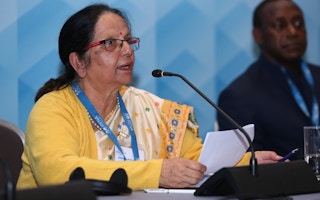As growth of renewables faces bottlenecks due to faltering investment and lagging grid upgrades needed to accommodate more solar and wind, bringing in citizens willing to take a direct stake in the clean energy switch could help revitalise momentum and hasten renewables deployment.
Global political leaders from Sierra Leone, India and the United Kingdom, among others, at the tenth assembly of the International Renewable Energy Agency (IRENA) in Abu Dhabi in January discussed how parliamentarians, in their role as a bridge between government and communities, could drive the clean energy transition.
They said through increased awareness of the benefits of renewables, conducive frameworks and financial incentives, governments could garner public support for renewables and foster citizen-led initiatives that could alleviate government budget constraints currently hampering clean energy development.
“As parliamentarians, we are agents of change in our society,” said Andries Gryffroy, a member of the Belgian parliament, speaking at the legislator’s forum of the assembly. “We represent the people. But it should no longer be about making decisions in the name of the people; it should be about working with them.”
“To speed up the shift to clean energy, you need to have your consumers and prosumers with you,” he told the audience. “Low budgets have slowed down the transition, but we must start thinking beyond government budgets. The approach has to be bottom-up, or the switch will not be affordable.”
There is a precedent for large-scale community-involvement in the shift towards renewables. Germany’s energy transition (energiewende) approach has been exceptional in that it has largely been driven by citizens rather than large energy utilities.
Incentivised by favourable feed-in-tariffs, citizens across the country have invested in solar panels and acquired shares in wind turbines since the 1990s. Some have even banded together to invest in larger-scale facilities that single individuals would not be able to afford.
“
We have made progress on renewables, but the scale [of the transition] is still not good enough.
Dr Kandeh Yumkella, member of parliament, Sierra Leone
Today, citizens’ renewable power ownership in Germany is remarkable. Of the 100.3 gigawatts (GW) of Germany’s renewable energy capacity in 2018, 31.5 per cent was owned by private individuals and another 10.5 per cent by farmers. Much of renewables expansion in recent years was driven by citizens’ onshore and offshore wind power projects.
Clean power transition needs to pick up speed
According to a new IRENA report, renewables have become the world’s primary source of new power capacity, outpacing all other forms of new generation put together. As of 2019, they covered 26 per cent of the global energy mix.
Over the past two years, however, global investment in renewable energy has been on the decline. In 2018, growth in clean energy capacity addition failed to increase year-on-year for the first time since 2001. IRENA says investment in the renewables sector stands at US$330 billion annually, but to hit climate targets, that figure must nearly double to US$750 billion a year by 2030, and renewable energy deployment must increase six-fold.
Dr Kandeh Yumkella, a member of parliament in Sierra Leone, said: “Governments are not fulfilling their promises to the next generation. What I see happening is that more and more communities turn to us legislators, saying we represent the people, we are close to the community, so it is our responsibility to engage the people to achieve the speed and the scale of the transition needed.”
“Parliamentarians must play greater a role in this transformation, working together with local and rural communities,” noted Vandana Chavan, a member of parliament in India. She said it was critical that parliamentarians encouraged citizens to actively participate in the energy transition and shed light on how renewables can boost local economies, bring cleaner air, and provide permanent jobs.
But to do that, Yumkella said, lawmakers must put aside their differences. Internal conflicts and disputes between political parties have often delayed energy policy agreements and led to fickle legislation that fluctuates with administrative shuffles, deterring private clean energy investors. Renewables subsidies such as feed-in-tariffs, for instance, are often implemented by one government, only to be removed by the next.
What is required, he observed, are frameworks conducive to clean energy development. “We have made progress on renewables, but the scale [of the transition] is still not good enough. If we are to change the trajectory of climate change, we need legislators to create a stable environment to have the amount of investment required to roll out more renewables,” he said.

















